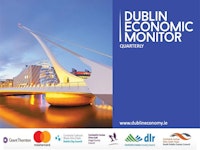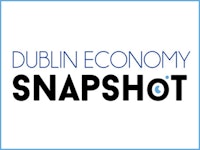The latest Dublin Economic Monitor, published this morning by the four Dublin Local Authorities, highlights a stable but slowing economy in Q2 2025, as employment reached record highs, retail spending continued to climb, and business activity held firm, despite rising unemployment and persistent global trade uncertainties.
Dublin & Ireland PMI
The Dublin S&P Global Purchasing Managers’ Index (PMI) showed that business activity in the Capital’s private sector increased in the second quarter of 2025, albeit at the softest rate of expansion since late 2023. The headline rate stood at 52.2, broadly in line with the 52.6 seen in the previous quarter and importantly remains above the 50-point mark that denotes expansion. All three sectors that make up business activity, were in expansion mode in Dublin in Q2. The Manufacturing sector (54.2) showed the strongest rate of growth, bouncing back from a contraction of 48.9 last quarter. The Construction (55.8) and Service (50.3) sectors also posted increases in activity but at slower rates than seen in Q1.
Dublin Unemployment Rate
Employment in the Capital rose to a new peak of 837,700 (SA) in Q2 2025, though the pace of growth slowed. At the same time, Dublin’s unemployment rate increased to 4.9% (SA), up from 4.3% in Q1. While still close to ‘full employment’, the labour market is showing signs of easing, with vacancy trends weakening. Job postings in Dublin on the Indeed platform continued to decline over the summer, falling 16.5 percentage points below the 2020 baseline in August, extending a medium-term downward trajectory.
Retail Spending
According to MasterCard data retail spending in the Dublin economy continued to grow modestly in the second quarter of 2025. Total expenditure in the Capital increased by 0.7% QoQ and 2.1% YoY to reach a new peak index value of 147.4 (2015 = 100). The index has now risen for five consecutive quarters. This steady upward trajectory, though modest in scale, underscores the resilience of consumer demand in Dublin despite persistent cost of living pressures and the drag of higher household expenses. Spending on Necessities remained the key driver of growth, increasing by 1.8% QoQ, with households continuing to prioritise essential goods such as groceries. Retail spending by tourists in Dublin also increased in Q2 2025, with overall expenditure rising by 2.0% QoQ. This marked a firmer outturn at the start of the summer season, following only marginal growth in Q1 and a small decline in Q4 2024.
Dublin House Commencements & Completions
In the residential sector, housing commencements fell for a fourth consecutive quarter to 952 units. This represented declines of 8.2% QoQ and 87.4% YoY, as the level of new starts dropped below 1,000 for only the third time in 10 years. Completions rebounded from a weak first quarter to stand at 4,080 (SA) in Q2, the highest level since the series began in 2011. This was more than double the level recorded in Q1, and represented YoY growth of 81.3%. Strong commencement rates in mid-2024 will be expected to continue to flow through to completions in Q3.
FDI Capital Investment per Capita & Average Project Value, Rolling 4 Quarters, Q2 2025
Based on a rolling 4 quarter average, foreign direct investment (FDI) into Dublin declined in Q2 2025 as international trade policy uncertainties continued. Average capital investment declined by almost a third QoQ to $552.2 million in the quarter. Job creation also fell marginally (-1.5%) to 1,773. YoY declines were sharper across both capital investment (-37.6%) and jobs (-16.1%). In spite of a shift towards less capital-intensive projects in the quarter, bringing the average project value down to $19 million, Dublin continues to demonstrate strong FDI performance per capita ($480), relative to its European counterparts.
“The latest Monitor shows Dublin’s economy balancing resilience with a slowing pace. Employment remains at record highs, consumer spending is edging upwards, and all sectors of business activity are still in expansion. Yet, the rise in unemployment, weakening vacancy trends, and a sharp fall in housing commencements are important signals that the city cannot ignore. The rebound in housing completions is encouraging, but without a stronger pipeline, supply pressures will persist. Meanwhile, retail and tourism spending demonstrate the continued strength of Dublin’s consumer economy, even against global trade headwinds. Taken together, the Capital is holding firm, but with momentum becoming more measured, policy delivery on housing and infrastructure will be crucial to sustaining confidence in the months ahead.”
ANDREW WEBB, CHIEF ECONOMIST WITH GRANT THORNTON
The Dublin Economic Monitor is produced by Grant Thornton on behalf of the four Dublin Local Authorities to provide timely, reliable data and commentary on the economic landscape of the Dublin region. It covers 18 key indicators, consumer spending data from the MasterCard SpendingPulse™ and provides regular insights into different aspects of Dublin’s economy.




